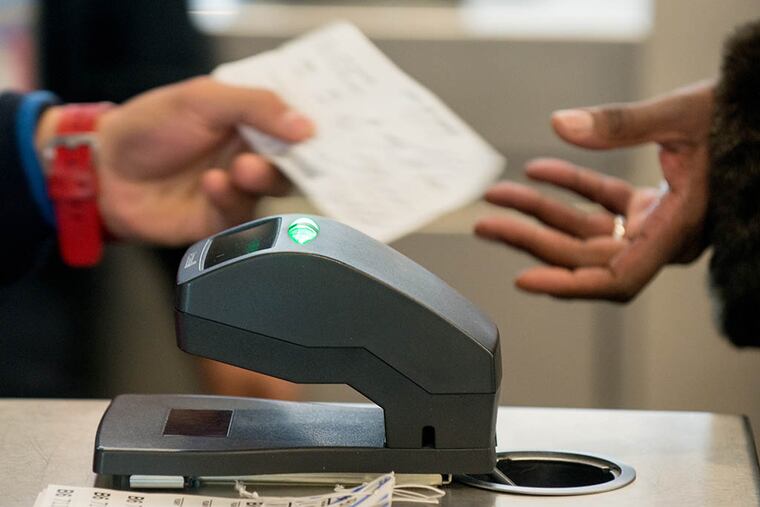Airports look to nearly double 'facility fee'
Airlines nickel and dime passengers to check a bag, for seats with extra legroom, and to change a ticket. Spirit and Frontier charge to put a carry-on in the overhead bin.

Airlines nickel and dime passengers to check a bag, for seats with extra legroom, and to change a ticket. Spirit and Frontier charge to put a carry-on in the overhead bin.
Now, airports want to increase the passenger "facility fee" added to every airline ticket - from $4.50 to $8.50, to pay for construction projects and infrastructure needs.
That would be $8.50 each way - when you get on a plane to leave for a trip, and when you board the flight home.
In Philadelphia, the usage fee generates about $61 million annually, and has helped pay debt on bonds to build the international Terminal A West, Terminal F, and the expansion to Terminals D and E, as well as airfield and other improvements, said Philadelphia International Airport CEO Mark Gale.
Hiking the fee for fliers will be debated by Congress as part of policy legislation for the Federal Aviation Administration, whose authorization expires in September. The user fee increase has been proposed by airports since at least 2007 and by President Obama in recent budget requests.
Congress capped the fee at $4.50 in 2000. But with inflation and higher construction costs, airports say that buys only half of what it did 15 years ago.
Airlines and the trade association Airlines for America oppose the increase, saying it would discourage air travel. They contend airports can get money in other ways, including from airline rentals and fees, and from non-airline revenue such as concessions and rental-car operators.
Airports argue that the higher fee is modest compared with how much airlines charge to check a bag ($25) and to change a ticket (up to $200).
"This is not a tax. This does not go off to the federal government," Gale said. "This comes to the airports, and has to be spent on projects approved by the FAA." The fee is remitted by airlines to the airport where passengers board the flight.
Two industry groups, Airports Council International-North America and the American Association of Airport Executives, have put together a 20-page report detailing $75 billion in needed construction projects.
Airlines for America contends that many improvements have been made to U.S. airports. "Since 2008, more than $70 billion in capital improvement projects have been completed, are underway, or have been approved by U.S. airlines and their airport partners at the country's largest 30 airports."
Both sides are lobbying lawmakers.
Lined up against a higher fee are FlyersRights.org, a passenger-rights group; Travel United, a consumer travel group; and the Association of Corporate Travel Executives.
Supporting the increased fee are the Business Travel Coalition, a Radnor group representing corporate travel managers, and the U.S. Travel Association, whose members include hotels, convention and visitor bureaus, and car-rental agencies.
"If airlines have their way on the passenger facility-charge issue, they will do for the airport experience what they have done to the cabin experience," said Kevin Mitchell, chairman of the Business Travel Coalition. "We need modern, efficient, and customer-oriented airports if we are to reach the president's goal of growing from 75 million annual tourists today to 100 million by 2021."
No U.S. airports currently are ranked among the world's top 25, according to a 2015 survey of airline customers. (The top-ranked airport was Singapore's, followed by those in Incheon in South Korea, Munich, Germany, and Hong Kong.)
"We used to be the leaders in this industry not that long ago," Gale said. "Much like the discussion about highways and bridges crumbling and falling apart," airports have "fewer and fewer resources available to them to accomplish the kinds of improvements that they need."
Paul Hudson, president of FlyersRights.org, said consumers should not have to pay more. He suggested taxing the $6 billion collected annually by U.S. airlines for seating assignments, priority boarding, and WiFi to "use for airport expansion and passenger-support programs."
"Air travel costs are being inflated by 50 percent or more by unnecessary taxes and airline- [and] airport-imposed fees and charges," Hudson said. "They should be giving back to the traveling public, not seeking to take more."
Airline Fees
Selected charges by airlines with key operations in the region.
American Airlines Frontier Airlines
Carry-on bag - $25 online
$25, $50
(airport, gate)
First checked bag $25* $20 online
$25 at airport
Second checked bag $35 $30
Additional bags $150 each $75 each
Pets $125 cabin $75-$125 cabin
$150-$175 cargo -
Seating Preferred Select $4-$99 $5-$15
Stretch
$15-$100
Priority boarding $9 to $40 -
Change fee $200** $75-$125
ahead of time
$25-$100
same day
On-phone booking $25 $0
Unaccompanied minor $150 $100-$150
*No charge on international flights
**On a nonrefundable ticket
SOURCE: SmarterTravel.comEndText